Discover Tax Smart Real Estate Investors Podcast
Tax Smart Real Estate Investors Podcast

Tax Smart Real Estate Investors Podcast
Author: Hall CPA
Subscribed: 865Played: 40,911Subscribe
Share
© All rights reserved
Description
The Tax Smart Real Estate Investors Podcast is a show that focuses on tax, accounting, and finance tips for real estate investors and business owners. We bring on guests to talk through complex topics and we break it down into bite-sized chunks of knowledge for our listeners.
Our episodes generally run 30-60 minutes of no-nonsense, hard-hitting information. We know your time is valuable so our goal is to save you thousands of dollars per episode.
Hall CPA, PLLC is a CPA firm that exclusively serves real estate investors and real estate business owners. We work with syndicators and developers closing multi-million dollar deals, as well as small investors building a portfolio from scratch.
Check us out at www.TheRealEstateCPA.com/Podcast for more free content and information.
Enjoy!
The Tax Smart Real Estate Investors podcast is for general information purposes only and is not intended to provide, and should not be relied on for, tax, legal, or accounting advice. Information on the podcast may not constitute the most up-to-date legal or other information. No reader, user, or listener of this podcast should act or refrain from acting on the basis of information on this podcast without first seeking legal and tax advice from counsel in the relevant jurisdiction. Only your individual attorney and tax advisor can provide assurances that the information contained herein – and your interpretation of it – is applicable or appropriate to your particular situation. Use of, and access to, this podcast or any of the links or resources contained or mentioned within the podcast show and show notes do not create a relationship between the reader, user, or listener and podcast hosts, contributors, or guests. Any mention of third-party vendors, products, or services does not constitute an endorsement or recommendation. You should conduct your own due diligence before engaging with any vendor
Our episodes generally run 30-60 minutes of no-nonsense, hard-hitting information. We know your time is valuable so our goal is to save you thousands of dollars per episode.
Hall CPA, PLLC is a CPA firm that exclusively serves real estate investors and real estate business owners. We work with syndicators and developers closing multi-million dollar deals, as well as small investors building a portfolio from scratch.
Check us out at www.TheRealEstateCPA.com/Podcast for more free content and information.
Enjoy!
The Tax Smart Real Estate Investors podcast is for general information purposes only and is not intended to provide, and should not be relied on for, tax, legal, or accounting advice. Information on the podcast may not constitute the most up-to-date legal or other information. No reader, user, or listener of this podcast should act or refrain from acting on the basis of information on this podcast without first seeking legal and tax advice from counsel in the relevant jurisdiction. Only your individual attorney and tax advisor can provide assurances that the information contained herein – and your interpretation of it – is applicable or appropriate to your particular situation. Use of, and access to, this podcast or any of the links or resources contained or mentioned within the podcast show and show notes do not create a relationship between the reader, user, or listener and podcast hosts, contributors, or guests. Any mention of third-party vendors, products, or services does not constitute an endorsement or recommendation. You should conduct your own due diligence before engaging with any vendor
376 Episodes
Reverse
In this episode of the Tax Smart REI Podcast, Thomas Castelli and Nathan Sosa, Head of the National Tax Department at Hall CPA, sit down with Alex Savage, CPA, CFP, to unpack the Mega Backdoor Roth 401(k), one of the most powerful yet underutilized tax strategies for high-income earners.
They break down how the strategy works, who qualifies, and why it can be a game-changer for those looking to build long-term, tax-free retirement wealth, all while balancing real estate investing and other income streams. From contribution limits and in-plan conversions to control group rules and timing, this episode covers everything you need to know to decide whether this advanced strategy fits your situation.
You’ll learn:
- What makes the “Mega” Backdoor Roth 401(k) different from a traditional or standard Roth IRA
- How high-income W-2 earners and solopreneurs can contribute up to $70,000+ in after-tax dollars
- Why this strategy can help you manage future tax rates, Social Security taxation, and estate planning
- The key testing and timing rules to avoid IRS pitfalls
- When a Mega Backdoor Roth makes sense and when real estate might be the better play
Whether you’re a tech executive, business owner, or high-earning real estate investor, this episode gives you the clarity to determine if the Mega Backdoor Roth 401(k) belongs in your financial toolkit and how to use it strategically alongside your real estate portfolio.
To become a client, request a consultation from Hall CPA, PLLC at go.therealestatecpa.com/3KSEev6
Subscribe to REI Daily & Enter to Win a FREE Strategy Call:
go.therealestatecpa.com/41JuQBX
Connect with Engineered Tax Services:
https://portal.engineeredtaxservices.com/cost-segregation/quick-start?utm_source=Live+Event&utm_medium=Others&utm_campaign=hall_cpa&pagesense_source=729733000061045013&utm_term=kim_lochridge&utm_content=cost_segregation
Get the Solar White Paper:
www.therealestatecpa.com/solar-white-paper/
The Tax Smart Real Estate Investors podcast is for general information purposes only and is not intended to provide, and should not be relied on for, tax, legal, or accounting advice. Information on the podcast may not constitute the most up-to-date legal or other information. No reader, user, or listener of this podcast should act or refrain from acting on the basis of information on this podcast without first seeking legal and tax advice from counsel in the relevant jurisdiction. Only your individual attorney and tax advisor can provide assurances that the information contained herein – and your interpretation of it – is applicable or appropriate to your particular situation. Use of, and access to, this podcast or any of the links or resources contained or mentioned within the podcast show and show notes do not create a relationship between the reader, user, or listener and podcast hosts, contributors, or guests. Any mention of third-party vendors, products, or services does not constitute an endorsement or recommendation. You should conduct your own due diligence before engaging with any vendor.
In this episode of the Tax Smart REI Podcast, Thomas Castelli and Nathan Sosa, Head of the National Tax Department at Hall CPA, dive deep into solar tax credits: how they work, who qualifies, and whether they can truly offset your tax liability as a real estate investor.
From residential installations to short-term rentals and syndicated solar investments, Thomas and Nathan unpack the real opportunities and limitations of this increasingly popular strategy. They break down how the 30% credit applies, what deadlines matter, and why material participation plays a critical role in determining whether your solar investment is active or passive for tax purposes.
You’ll learn:
- How the 30% solar tax credit works for personal, rental, and business properties
- The key deadlines for claiming residential solar credits before they expire in 2025
- Why material participation determines if your solar credits can offset active income
- How to combine bonus depreciation and solar credits for a “double benefit”
- The truth about syndicated solar credit deals and whether they’re legitimate
Whether you’re curious about installing solar on your own properties or exploring syndicated solar investments, this episode gives you a clear-eyed look at the tax benefits, the fine print, and the pitfalls to avoid before making your next move.
To become a client, request a consultation from Hall CPA, PLLC at go.therealestatecpa.com/3KSEev6
Subscribe to REI Daily & Enter to Win a FREE Strategy Call:
go.therealestatecpa.com/41JuQBX
Connect with Engineered Tax Services:
https://portal.engineeredtaxservices.com/cost-segregation/quick-start?utm_source=Live+Event&utm_medium=Others&utm_campaign=hall_cpa&pagesense_source=729733000061045013&utm_term=kim_lochridge&utm_content=cost_segregation
Get the Solar White Paper:
https://www.therealestatecpa.com/solar-white-paper/
The Tax Smart Real Estate Investors podcast is for general information purposes only and is not intended to provide, and should not be relied on for, tax, legal, or accounting advice. Information on the podcast may not constitute the most up-to-date legal or other information. No reader, user, or listener of this podcast should act or refrain from acting on the basis of information on this podcast without first seeking legal and tax advice from counsel in the relevant jurisdiction. Only your individual attorney and tax advisor can provide assurances that the information contained herein – and your interpretation of it – is applicable or appropriate to your particular situation. Use of, and access to, this podcast or any of the links or resources contained or mentioned within the podcast show and show notes do not create a relationship between the reader, user, or listener and podcast hosts, contributors, or guests. Any mention of third-party vendors, products, or services does not constitute an endorsement or recommendation. You should conduct your own due diligence before engaging with any vendor.
In this episode of the Tax Smart REI Podcast, Thomas Castelli and Justin Shore discuss essential year-end tax strategies for real estate investors looking to close out 2025 strong. As Q4 winds down, they walk through the most effective levers you can pull before December 31 to minimize taxes, maximize deductions, and set yourself up for a smoother filing season.
From vehicle deductions and short-term rental timing to real estate professional status, cost segregation, and the latest SALT deduction updates, Thomas and Justin share practical insights for both active and passive investors. They also highlight common pitfalls, like letting the tax tail wag the dog, and explain how to apply these strategies correctly in your own situation.
You’ll learn:
- How to qualify for 100% bonus depreciation on vehicles and real estate in 2025
- What it really takes to lock in short-term rental tax benefits before year-end
- Why REPS qualification is nearly impossible to start from scratch in Q4
- When to complete a cost segregation study (and when it can wait)
- How the updated SALT cap could impact your AGI and deductions
- Key deadlines for 401(k)s, IRAs, HSAs, and paying your kids through your business
- Why bookkeeping and documentation now will save you headaches in tax season
Whether you’re a seasoned investor or just looking to make smart year-end moves, this episode breaks down the most valuable tax strategies for real estate professionals, with clear guidance on how to apply them responsibly and in compliance with the IRS.
To become a client, request a consultation from Hall CPA, PLLC at go.therealestatecpa.com/3KSEev6
Subscribe to REI Daily & Enter to Win a FREE Strategy Call:
go.therealestatecpa.com/41JuQBX
The Tax Smart Real Estate Investors podcast is for general information purposes only and is not intended to provide, and should not be relied on for, tax, legal, or accounting advice. Information on the podcast may not constitute the most up-to-date legal or other information. No reader, user, or listener of this podcast should act or refrain from acting on the basis of information on this podcast without first seeking legal and tax advice from counsel in the relevant jurisdiction. Only your individual attorney and tax advisor can provide assurances that the information contained herein – and your interpretation of it – is applicable or appropriate to your particular situation. Use of, and access to, this podcast or any of the links or resources contained or mentioned within the podcast show and show notes do not create a relationship between the reader, user, or listener and podcast hosts, contributors, or guests. Any mention of third-party vendors, products, or services does not constitute an endorsement or recommendation. You should conduct your own due diligence before engaging with any vendor.
In this episode of the Tax Smart REI Podcast, Thomas Castelli sits down with Matt Hamilton and Nathan Sosa, co-hosts of the Major League Real Estate Podcast and leaders at Hall CPA, to unpack the complex world of real estate syndications and funds and the tax traps that even seasoned operators overlook.
Matt and Nathan work directly with large private equity clients and syndicators, managing tens to hundreds of millions in assets. Together, they break down what it really takes to structure deals, protect investors, and stay compliant when managing other people’s money. From operating agreements to bonus depreciation, this episode reveals why running a syndication isn’t just about raising capital. It’s about running a business the right way.
You’ll learn:
- The key differences between syndications and funds (and how to choose the right structure)
- The biggest mistakes operators make with their operating agreements and tax allocations
- How to avoid costly issues with K-1s, depreciation, and recapture
- What fund managers must know about open vs. closed funds and investor onboarding
- Why choosing the right CPA can protect your reputation and your investors’ returns
Whether you’re an experienced syndicator or just thinking about launching your first fund, this episode is packed with essential insights on how to operate, report, and grow like a professional, without putting your investors or your business at risk.
To become a client, request a consultation from Hall CPA, PLLC at go.therealestatecpa.com/3KSEev6
Subscribe to REI Daily & Enter to Win a FREE Strategy Call:
go.therealestatecpa.com/41JuQBX
The Tax Smart Real Estate Investors podcast is for general information purposes only and is not intended to provide, and should not be relied on for, tax, legal, or accounting advice. Information on the podcast may not constitute the most up-to-date legal or other information. No reader, user, or listener of this podcast should act or refrain from acting on the basis of information on this podcast without first seeking legal and tax advice from counsel in the relevant jurisdiction. Only your individual attorney and tax advisor can provide assurances that the information contained herein – and your interpretation of it – is applicable or appropriate to your particular situation. Use of, and access to, this podcast or any of the links or resources contained or mentioned within the podcast show and show notes do not create a relationship between the reader, user, or listener and podcast hosts, contributors, or guests. Any mention of third-party vendors, products, or services does not constitute an endorsement or recommendation. You should conduct your own due diligence before engaging with any vendor.
In this episode of the Tax Smart REI Podcast, Thomas Castelli sits down with Annette Grant and Sarah Karakaian, co-founders of Thanks for Visiting, to reveal what it really takes to run a profitable short-term rental business in today’s market.
Annette and Sarah have coached thousands of hosts on how to build scalable, hospitality-driven operations that actually make money. Together, they unpack the truth behind STR success, from pricing and KPIs to bookkeeping and mindset, and why short-term rentals are not the “passive income” opportunity many think they are.
You’ll learn:
- The #1 reason most hosts leave money on the table (and how to fix it)
- The five KPIs every short-term rental owner should track
- Why running a short-term rental is running a business, not just owning a property
- How clean bookkeeping and P&Ls protect you in an audit (and keep profits real)
- The right mindset for long-term success and how to balance cash flow, tax savings, and lifestyle goals
Whether you’re managing your first Airbnb or scaling a growing STR portfolio, this episode is packed with real-world advice on how to stop letting emotion drive decisions and start running your short-term rentals like a professional business.
To become a client, request a consultation from Hall CPA, PLLC at go.therealestatecpa.com/3KSEev6
Subscribe to REI Daily & Enter to Win a FREE Strategy Call:
go.therealestatecpa.com/41JuQBX
Connect with Thanks for Visiting: https://thanksforvisiting.com/
The Tax Smart Real Estate Investors podcast is for general information purposes only and is not intended to provide, and should not be relied on for, tax, legal, or accounting advice. Information on the podcast may not constitute the most up-to-date legal or other information. No reader, user, or listener of this podcast should act or refrain from acting on the basis of information on this podcast without first seeking legal and tax advice from counsel in the relevant jurisdiction. Only your individual attorney and tax advisor can provide assurances that the information contained herein – and your interpretation of it – is applicable or appropriate to your particular situation. Use of, and access to, this podcast or any of the links or resources contained or mentioned within the podcast show and show notes do not create a relationship between the reader, user, or listener and podcast hosts, contributors, or guests. Any mention of third-party vendors, products, or services does not constitute an endorsement or recommendation. You should conduct your own due diligence before engaging with any vendor.
In this episode of the Tax Smart REI Podcast, Thomas and Ryan sit down with short-term rental expert Taylor Jones to break down how investors are transforming ordinary Airbnbs into high-ROI “money machines”, even as the STR landscape becomes more competitive.
Tune in to learn:
- Why data-driven decisions outperform emotion-based investing every time.
- How to identify high-demand markets with built-in traveler traffic and lower risk.
- The amenities and design upgrades (like pickleball courts and pools) that can add $30K–$70K in annual revenue.
- The 4 ROI levers that drive long-term wealth: tax savings, cash flow, principal paydown, and appreciation.
- How to go from zero to under contract in just 32 days and why timing your launch can supercharge returns.
- The smart 2025 strategy: buy now, rebrand later to maximize tax benefits and long-term performance.
Whether you’re looking to buy your first STR or scale a growing portfolio, this episode is a must-listen guide to building a short-term rental business that actually pays you, month after month, year after year.
To become a client, request a consultation from Hall CPA, PLLC at go.therealestatecpa.com/3KSEev6
Subscribe to REI Daily & Enter to Win a FREE Strategy Call:
go.therealestatecpa.com/41JuQBX
Connect with Eckard Enterprises: eckardenterprises.com/taxsmartrei/
Connect with Taylor: https://strsearch.com/
The Tax Smart Real Estate Investors podcast is for general information purposes only and is not intended to provide, and should not be relied on for, tax, legal, or accounting advice. Information on the podcast may not constitute the most up-to-date legal or other information. No reader, user, or listener of this podcast should act or refrain from acting on the basis of information on this podcast without first seeking legal and tax advice from counsel in the relevant jurisdiction. Only your individual attorney and tax advisor can provide assurances that the information contained herein – and your interpretation of it – is applicable or appropriate to your particular situation. Use of, and access to, this podcast or any of the links or resources contained or mentioned within the podcast show and show notes do not create a relationship between the reader, user, or listener and podcast hosts, contributors, or guests. Any mention of third-party vendors, products, or services does not constitute an endorsement or recommendation. You should conduct your own due diligence before engaging with any vendor.
In this episode of the Tax Smart REI Podcast, hosts Thomas Castelli and Ryan Carriere dive into one of the most-requested topics from high-income investors and professionals, W-2 tax strategies.
Tune in to learn:
- Why W-2 income is so highly taxed and the biggest obstacles to offsetting it
- How Section 469 passive activity rules work and proven ways to navigate them with real estate professional status (REPS) or short-term rentals
- How the $626,000 Excess Business Loss (EBL) limit applies to high earners and how to strategically plan around it
- Ways to generate non-passive losses through active businesses and oil & gas investments
- How to stack charitable deductions (like donor-advised funds, CRTs, and CLTs) on top of business losses for maximum impact
- Traditional but powerful tactics, including 401(k)s, HSAs, SALT deductions, and capital loss harvesting
- Which “too-good-to-be-true” tax schemes to avoid and how to spot them before they get you audited
This comprehensive breakdown gives you a complete view of W-2 taxation.
To become a client, request a consultation from Hall CPA, PLLC at go.therealestatecpa.com/3KSEev6
Subscribe to REI Daily & Enter to Win a FREE Strategy Call:
go.therealestatecpa.com/41JuQBX
Connect with Eckard Enterprises: eckardenterprises.com/taxsmartrei/
The Tax Smart Real Estate Investors podcast is for general information purposes only and is not intended to provide, and should not be relied on for, tax, legal, or accounting advice. Information on the podcast may not constitute the most up-to-date legal or other information. No reader, user, or listener of this podcast should act or refrain from acting on the basis of information on this podcast without first seeking legal and tax advice from counsel in the relevant jurisdiction. Only your individual attorney and tax advisor can provide assurances that the information contained herein – and your interpretation of it – is applicable or appropriate to your particular situation. Use of, and access to, this podcast or any of the links or resources contained or mentioned within the podcast show and show notes do not create a relationship between the reader, user, or listener and podcast hosts, contributors, or guests. Any mention of third-party vendors, products, or services does not constitute an endorsement or recommendation. You should conduct your own due diligence before engaging with any vendor.
From the cockpit to commercial real estate, Tait's story shows how a high-earning W-2 professional can build wealth outside of the stock market. In this episode of the Tax Smart REI Podcast, Tait shares the lessons he learned moving from single-family to multifamily to syndications and the strategies that help pilots and other professionals put their money to work more effectively.
You'll learn:
- How Tait’s early mistakes shaped his investing philosophy
- Why LPs should evaluate sponsors before the deal
- Where commercial real estate sits in today’s cycle
- How oil & gas and STRs can reduce taxes for W-2 earners
- Why access to alternatives in retirement accounts could be a game-changer
To become a client, request a consultation from Hall CPA, PLLC at go.therealestatecpa.com/3KSEev6
Subscribe to REI Daily & Enter to Win a FREE Strategy Call:
go.therealestatecpa.com/41JuQBX
Connect with Eckard Enterprises: eckardenterprises.com/taxsmartrei/
More From Tait:
Website: https://www.turbinecap.com
Co-authored Oil and Gas eBook:
https://drive.google.com/file/d/17jUYSuoJGCU2ea4SN6MLgazmp-3LE2Lt/view?usp=share_link
Daniel Rusteen's Airbnb book:
https://www.amazon.com/Optimize-Your-Airbnb-audiobook/dp/B07R7CCKPK/ref=sr_1_1?dib=eyJ2IjoiMSJ9.RuqABHwSbg5DlqM7IpdbdyWEN0kpPfMH9Zirre2T_2LGjHj071QN20LucGBJIEps.Twgy40bFLaRKl4w4yOQGk7aOq7kWbEn890lz81_OJDU&dib_tag=se&hvadid=693594071991&hvdev=c&hvexpln=67&hvlocphy=1027744&hvnetw=g&hvocijid=18402973686594528136--&hvqmt=e&hvrand=18402973686594528136&hvtargid=kwd-2430861329715&hydadcr=21936_13365930&keywords=optimize+your+bnb+by+daniel+rusteen&mcid=e22c221c33dd3f379af9461f5fcc2624&qid=1757789681&sr=8-1
The Tax Smart Real Estate Investors podcast is for general information purposes only and is not intended to provide, and should not be relied on for, tax, legal, or accounting advice. Information on the podcast may not constitute the most up-to-date legal or other information. No reader, user, or listener of this podcast should act or refrain from acting on the basis of information on this podcast without first seeking legal and tax advice from counsel in the relevant jurisdiction. Only your individual attorney and tax advisor can provide assurances that the information contained herein – and your interpretation of it – is applicable or appropriate to your particular situation. Use of, and access to, this podcast or any of the links or resources contained or mentioned within the podcast show and show notes do not create a relationship between the reader, user, or listener and podcast hosts, contributors, or guests. Any mention of third-party vendors, products, or services does not constitute an endorsement or recommendation. You should conduct your own due diligence before engaging with any vendor.
Estate planning is one of the most overlooked parts of real estate investing, but without it, your portfolio and family can be left exposed. This week on the Tax Smart REI Podcast, we sit down with attorney, broker, and investor Diana Khan to talk about how real estate investors should approach estate planning.
You'll learn:
- Why every investor needs at least a will and power of attorney (even at 18)
- The difference between wills and trusts, explained with Diana’s “backpack” analogy
- How to decide between revocable and irrevocable trusts
- Practical ways to structure LLCs and holding companies for asset protection
- When (if ever) offshore trusts make sense
- How life insurance ties into your estate plan
Whether you own one rental or a hundred, this episode will show you how to protect your assets, minimize risk, and create a plan that works for your family and your future.
Connect with Diana: https://www.dklawmd.com/
Connect with Eckard Enterprises: https://eckardenterprises.com/taxsmartrei/
To become a client, request a consultation from Hall CPA, PLLC at go.therealestatecpa.com/3KSEev6
Subscribe to REI Daily & Enter to Win a FREE Strategy Call:
go.therealestatecpa.com/41JuQBX
The Tax Smart Real Estate Investors podcast is for general information purposes only and is not intended to provide, and should not be relied on for, tax, legal, or accounting advice. Information on the podcast may not constitute the most up-to-date legal or other information. No reader, user, or listener of this podcast should act or refrain from acting on the basis of information on this podcast without first seeking legal and tax advice from counsel in the relevant jurisdiction. Only your individual attorney and tax advisor can provide assurances that the information contained herein – and your interpretation of it – is applicable or appropriate to your particular situation. Use of, and access to, this podcast or any of the links or resources contained or mentioned within the podcast show and show notes do not create a relationship between the reader, user, or listener and podcast hosts, contributors, or guests. Any mention of third-party vendors, products, or services does not constitute an endorsement or recommendation. You should conduct your own due diligence before engaging with any vendor.
In this episode of the Tax Smart REI Podcast, Thomas Castelli and Ryan Carriere, CPA, answer real investor questions from the investing community, tackling some of the most pressing topics around bonus depreciation, short-term rentals, and advanced tax planning.
Tune in to learn:
- How cost segregation results differ between condos, single-family homes, and properties with big-ticket land improvements like pools
- Why new renovations on older rentals may still qualify for 100% bonus depreciation under the latest rules
- The nuances of converting a personal residence into a short-term rental, and when only 40% bonus depreciation applies
- The pros and cons of using Form 3115 to catch up missed depreciation—and why DIY may not be the best option
- Key IRS rules around ADUs, STR participation, and what really triggers depreciation recapture
This Q&A-style episode delivers practical answers to questions investors are asking right now in 2025.
To become a client, request a consultation from Hall CPA, PLLC at go.therealestatecpa.com/3KSEev6
Get your FREE ticket to the 2025 Tax, Legal, and Wealth Summit:
www.taxandlegalsummit.com/registration
Subscribe to REI Daily & Enter to Win a FREE Strategy Call:
go.therealestatecpa.com/41JuQBX
The Tax Smart Real Estate Investors podcast is for general information purposes only and is not intended to provide, and should not be relied on for, tax, legal, or accounting advice. Information on the podcast may not constitute the most up-to-date legal or other information. No reader, user, or listener of this podcast should act or refrain from acting on the basis of information on this podcast without first seeking legal and tax advice from counsel in the relevant jurisdiction. Only your individual attorney and tax advisor can provide assurances that the information contained herein – and your interpretation of it – is applicable or appropriate to your particular situation. Use of, and access to, this podcast or any of the links or resources contained or mentioned within the podcast show and show notes do not create a relationship between the reader, user, or listener and podcast hosts, contributors, or guests. Any mention of third-party vendors, products, or services does not constitute an endorsement or recommendation. You should conduct your own due diligence before engaging with any vendor.
In this episode of the Tax Smart REI Podcast, Thomas Castelli and Ryan Carriere, CPA, break down the two most common questions investors are asking after the passage of the “Big Beautiful Bill” and the return of 100% bonus depreciation:
- Should you invest in real estate or specifically short-term rentals for tax savings?
- When does it make sense to start working with a tax strategist?
Tune in to learn:
- Why existing landlords who haven’t done tax planning may be leaving money on the table
- How to decide if short-term rentals make sense for your goals, lifestyle, and time commitment
- A step-by-step framework for estimating your first-year tax savings using bonus depreciation
- The reality of material participation, hours required, and capital needed to get started
- When to engage a tax strategist if you’re already in the game or just getting started
- Why time is running short in 2025, and how late you can still implement this strategy
To become a client, request a consultation from Hall CPA, PLLC at go.therealestatecpa.com/3KSEev6
Get your FREE ticket to the 2025 Tax, Legal, and Wealth Summit:
www.taxandlegalsummit.com/registration
Subscribe to REI Daily & Enter to Win a FREE Strategy Call:
go.therealestatecpa.com/41JuQBX
The Tax Smart Real Estate Investors podcast is for general information purposes only and is not intended to provide, and should not be relied on for, tax, legal, or accounting advice. Information on the podcast may not constitute the most up-to-date legal or other information. No reader, user, or listener of this podcast should act or refrain from acting on the basis of information on this podcast without first seeking legal and tax advice from counsel in the relevant jurisdiction. Only your individual attorney and tax advisor can provide assurances that the information contained herein – and your interpretation of it – is applicable or appropriate to your particular situation. Use of, and access to, this podcast or any of the links or resources contained or mentioned within the podcast show and show notes do not create a relationship between the reader, user, or listener and podcast hosts, contributors, or guests. Any mention of third-party vendors, products, or services does not constitute an endorsement or recommendation. You should conduct your own due diligence before engaging with any vendor.
In this episode of the Tax Smart REI Podcast, Thomas Castelli sits down with Hall CPA Advisory Manager Justin Shore to break down why bookkeeping isn’t just busy work, it’s the foundation of audit defense and financial success as a real estate investor.
Tune in to learn:
- Why sloppy bookkeeping can raise red flags and trigger IRS scrutiny
- The key differences between Schedule E and Schedule C—and why they matter for your rentals
- How proper categorization of expenses (like cleaning vs. repairs) can make or break your audit defense
- Why bank statements aren’t enough, and the documentation you must keep to substantiate deductions
- The penalties and costs of poor records and how to avoid them
- The line between bookkeepers and tax preparers, and what responsibilities truly fall on you
To become a client, request a consultation from Hall CPA, PLLC at go.therealestatecpa.com/3KSEev6
Get your FREE ticket to the 2025 Tax, Legal, and Wealth Summit:
www.taxandlegalsummit.com/registration
Subscribe to REI Daily & Enter to Win a FREE Strategy Call:
go.therealestatecpa.com/41JuQBX
The Tax Smart Real Estate Investors podcast is for general information purposes only and is not intended to provide, and should not be relied on for, tax, legal, or accounting advice. Information on the podcast may not constitute the most up-to-date legal or other information. No reader, user, or listener of this podcast should act or refrain from acting on the basis of information on this podcast without first seeking legal and tax advice from counsel in the relevant jurisdiction. Only your individual attorney and tax advisor can provide assurances that the information contained herein – and your interpretation of it – is applicable or appropriate to your particular situation. Use of, and access to, this podcast or any of the links or resources contained or mentioned within the podcast show and show notes do not create a relationship between the reader, user, or listener and podcast hosts, contributors, or guests. Any mention of third-party vendors, products, or services does not constitute an endorsement or recommendation. You should conduct your own due diligence before engaging with any vendor.
In this episode of the Tax Smart REI Podcast, Thomas and Ryan sit down with financial planner and short-term rental investor Zack Mattos to unpack how he went from a 20-year career focused solely on traditional retirement accounts to leveraging real estate to nearly eliminate his tax bill, including a staggering $943K in depreciation from one luxury rental property.
Tune in to learn:
- How he turned his Austin dream home into a high-income rental and tax-saving machine
- The cost segregation strategy that generated nearly $1M in depreciation in a single year
- Why he paused retirement account contributions to focus on real estate acquisitions
- How REP status transformed his tax outcomes and influenced client recommendations
- The S-corp move and family payroll strategy that added tens of thousands in annual savings
- His plan to build a portfolio of luxury rentals in one high-demand neighborhood for scale and ease of management
To become a client, request a consultation from Hall CPA, PLLC at go.therealestatecpa.com/3KSEev6
Get your FREE ticket to the 2025 Tax, Legal, and Wealth Summit:
www.taxandlegalsummit.com/registration
Subscribe to REI Daily & Enter to Win a FREE Strategy Call:
go.therealestatecpa.com/41JuQBX
Connect with Zack: https://www.zackmattos.com/
The Tax Smart Real Estate Investors podcast is for general information purposes only and is not intended to provide, and should not be relied on for, tax, legal, or accounting advice. Information on the podcast may not constitute the most up-to-date legal or other information. No reader, user, or listener of this podcast should act or refrain from acting on the basis of information on this podcast without first seeking legal and tax advice from counsel in the relevant jurisdiction. Only your individual attorney and tax advisor can provide assurances that the information contained herein – and your interpretation of it – is applicable or appropriate to your particular situation. Use of, and access to, this podcast or any of the links or resources contained or mentioned within the podcast show and show notes do not create a relationship between the reader, user, or listener and podcast hosts, contributors, or guests. Any mention of third-party vendors, products, or services does not constitute an endorsement or recommendation. You should conduct your own due diligence before engaging with any vendor
In this episode of the Tax Smart REI Podcast, Thomas and Ryan sit down with entrepreneur and investor John Paul Houston to unpack his journey from running a backyard chicken operation to building a $3.5M private lending portfolio and a 100+ door real estate empire — all while dramatically reducing his tax bill by qualifying as a Real Estate Professional.
Tune in to learn:
- How John went from semi-retirement to scaling multiple income-producing businesses
- Why he shifted from passive lending to active investing for greater returns and tax benefits
- The REP strategies and depreciation plays that helped him save big on taxes
- How he structures equity incentives to retain top talent and transfer ownership
- Why West Virginia is his secret weapon for finding 12-cap multifamily deals with minimal red tape
- The role private lending plays in his long-term diversification and estate planning
To become a client, request a consultation from Hall CPA, PLLC at go.therealestatecpa.com/3KSEev6
Get your FREE ticket to the 2025 Tax, Legal, and Wealth Summit:
www.taxandlegalsummit.com/registration
Subscribe to REI Daily & Enter to Win a FREE Strategy Call:
go.therealestatecpa.com/41JuQBX
The Tax Smart Real Estate Investors podcast is for general information purposes only and is not intended to provide, and should not be relied on for, tax, legal, or accounting advice. Information on the podcast may not constitute the most up-to-date legal or other information. No reader, user, or listener of this podcast should act or refrain from acting on the basis of information on this podcast without first seeking legal and tax advice from counsel in the relevant jurisdiction. Only your individual attorney and tax advisor can provide assurances that the information contained herein – and your interpretation of it – is applicable or appropriate to your particular situation. Use of, and access to, this podcast or any of the links or resources contained or mentioned within the podcast show and show notes do not create a relationship between the reader, user, or listener and podcast hosts, contributors, or guests.
In this episode of the Tax Smart REI Podcast, Thomas and Ryan sit down with entrepreneur and investor Marty Geier to unpack how he reduced his taxable income from $1.4 million to just $40K using a blend of business building, short-term rentals, and advanced tax strategy.
Tune in to learn:
- How Marty uses the 500-hour rule to make short-term rental losses non-passive and deductible
- Why he starts a new business each year and how it helps offset active income
- The exact way he structures his real estate and businesses to maximize Section 179 and bonus depreciation
- How he tracks performance across 10+ ventures to know when to scale, pivot, or exit
- What most investors underestimate about the real-time commitment of running rentals
To become a client, request a consultation from Hall CPA, PLLC at go.therealestatecpa.com/3KSEev6
Get your FREE ticket to the 2025 Tax, Legal, and Wealth Summit:
https://www.taxandlegalsummit.com/registration
Subscribe to REI Daily & Enter to Win a FREE Strategy Call:
go.therealestatecpa.com/41JuQBX
The Tax Smart Real Estate Investors podcast is for general information purposes only and is not intended to provide, and should not be relied on for, tax, legal, or accounting advice. Information on the podcast may not constitute the most up-to-date legal or other information. No reader, user, or listener of this podcast should act or refrain from acting on the basis of information on this podcast without first seeking legal and tax advice from counsel in the relevant jurisdiction. Only your individual attorney and tax advisor can provide assurances that the information contained herein – and your interpretation of it – is applicable or appropriate to your particular situation. Use of, and access to, this podcast or any of the links or resources contained or mentioned within the podcast show and show notes do not create a relationship between the reader, user, or listener and podcast hosts, contributors, or guests.
Before you commit to a whole life insurance policy, you need to understand what it really is and what it isn’t. This week on the Tax Smart REI Podcast, we sit down with financial planner Alex Savage, CPA and CFP, to break down the infinite banking concept and whether it truly makes sense for real estate investors and high-income earners.
You'll learn:
- What whole life insurance and infinite banking actually are (beyond the sales pitch)
- Why policy loans aren't “free money” and how they really work
- What hidden costs, commissions, and risks most people overlook
- How this strategy compares to simply investing in real estate or ETFs
- Who this approach might actually work for and who should avoid it
If you've been pitched on infinite banking or are wondering whether to use life insurance as an investment vehicle, this episode gives you the full picture so you can make an informed decision.
To become a client, request a consultation from Hall CPA, PLLC at go.therealestatecpa.com/3KSEev6
Subscribe to REI Daily & Enter to Win a FREE Strategy Call:
go.therealestatecpa.com/41JuQBX
The Tax Smart Real Estate Investors podcast is for general information purposes only and is not intended to provide, and should not be relied on for, tax, legal, or accounting advice. Information on the podcast may not constitute the most up-to-date legal or other information. No reader, user, or listener of this podcast should act or refrain from acting on the basis of information on this podcast without first seeking legal and tax advice from counsel in the relevant jurisdiction. Only your individual attorney and tax advisor can provide assurances that the information contained herein – and your interpretation of it – is applicable or appropriate to your particular situation. Use of, and access to, this podcast or any of the links or resources contained or mentioned within the podcast show and show notes do not create a relationship between the reader, user, or listener and podcast hosts, contributors, or guests.
Before you hire just any tax pro, you need to understand what a real estate-focused advisor can actually do for you. This week on the Tax Smart REI Podcast, we sit down with investor and developer Lauren Kraus to hear how working with a specialist helped her uncover over $280K in missed tax savings—and dramatically shift her investing strategy.
You'll learn:
- Why her CPA dismissed cost segregation (and why that was a $280K mistake)
- How real estate professional status (REPS) changed their entire tax position
- What Form 3115 did to retroactively unlock depreciation
- How tax strategy helped get her husband fully on board with real estate investing
If you’re self-managing, scaling across markets, or wondering what your current CPA might be missing, this episode will open your eyes to what’s possible with the right strategy in place.
To become a client, request a consultation from Hall CPA, PLLC at go.therealestatecpa.com/3KSEev6
Subscribe to REI Daily & Enter to Win a FREE Strategy Call:
go.therealestatecpa.com/41JuQBX
The Tax Smart Real Estate Investors podcast is for general information purposes only and is not intended to provide, and should not be relied on for, tax, legal, or accounting advice. Information on the podcast may not constitute the most up-to-date legal or other information. No reader, user, or listener of this podcast should act or refrain from acting on the basis of information on this podcast without first seeking legal and tax advice from counsel in the relevant jurisdiction. Only your individual attorney and tax advisor can provide assurances that the information contained herein – and your interpretation of it – is applicable or appropriate to your particular situation. Use of, and access to, this podcast or any of the links or resources contained or mentioned within the podcast show and show notes do not create a relationship between the reader, user, or listener and podcast hosts, contributors, or guests.
In this week’s episode of the Tax Smart REI Podcast, Thomas Castelli and Nathan Sosa break down everything real estate investors and business owners need to know about the now-official “Big Beautiful Bill”, the sweeping tax package that just became law.
Key topics covered:
- 100% bonus depreciation is back and permanent: who qualifies and when it starts
- QBI updates: simplified rules, new thresholds, and small business wins
- SALT cap expansion (finally!) and what the five-year phase-in means for planning
- Section 179 expensing: higher limits and how it benefits STRs and commercial assets
- Qualified Opportunity Zones get renewed: what’s changing in 2027
- And more!
Plus, we highlight the planning window left in 2025, how to take action before year-end, and why this bill sets the stage for strategic investing and long-term tax savings.
To become a client, request a consultation from Hall CPA, PLLC at go.therealestatecpa.com/3KSEev6
Subscribe to REI Daily & Enter to Win a FREE Strategy Call:
go.therealestatecpa.com/41JuQBX
The Tax Smart Real Estate Investors podcast is for general information purposes only and is not intended to provide, and should not be relied on for, tax, legal, or accounting advice. Information on the podcast may not constitute the most up-to-date legal or other information. No reader, user, or listener of this podcast should act or refrain from acting on the basis of information on this podcast without first seeking legal and tax advice from counsel in the relevant jurisdiction. Only your individual attorney and tax advisor can provide assurances that the information contained herein – and your interpretation of it – is applicable or appropriate to your particular situation. Use of, and access to, this podcast or any of the links or resources contained or mentioned within the podcast show and show notes do not create a relationship between the reader, user, or listener and podcast hosts, contributors, or guests.
Before you syndicate your first deal, you need to get your legal foundation right. This week on the Tax Smart REI Podcast, we sit down with Tilden Moschetti, real estate attorney and experienced syndicator, to talk through the legal must-haves for your first capital raise. You'll learn:
- When a deal becomes a syndication in the eyes of the SEC
- The two-entity structure every sponsor should use
- What PPMs, subscription agreements, and operating agreements actually do
- Why you shouldn’t rely on capital raisers (and how to avoid SEC trouble)
Whether you're raising $200K or $2M+, this episode is packed with real-world advice to help you syndicate legally and confidently.
To become a client, request a consultation from Hall CPA, PLLC at go.therealestatecpa.com/3KSEev6
Subscribe to REI Daily & Enter to Win a FREE Strategy Call:
go.therealestatecpa.com/41JuQBX
Connect with Eckard Enterprises: eckardenterprises.com/taxsmartrei/
The Tax Smart Real Estate Investors podcast is for general information purposes only and is not intended to provide, and should not be relied on for, tax, legal, or accounting advice. Information on the podcast may not constitute the most up-to-date legal or other information. No reader, user, or listener of this podcast should act or refrain from acting on the basis of information on this podcast without first seeking legal and tax advice from counsel in the relevant jurisdiction. Only your individual attorney and tax advisor can provide assurances that the information contained herein – and your interpretation of it – is applicable or appropriate to your particular situation. Use of, and access to, this podcast or any of the links or resources contained or mentioned within the podcast show and show notes do not create a relationship between the reader, user, or listener and podcast hosts, contributors, or guests.
In this week’s episode of the Tax Smart REI Podcast, Thomas and Ryan answer real estate tax questions submitted by the community. From LLC structuring and grouping elections to retroactive cost segregation and solo 401(k) eligibility, this Q&A session covers some of the most common (and confusing) issues investors face midyear.
Key topics covered:
- Can I move my STR into an LLC if the deed and mortgage are in my name?
- Why short-term rentals can’t be included in a Dash-9 grouping election
- What counts as "placed in service" when a tenant isn’t paying rent
- How to take 100% bonus depreciation in 2025 for a 2022 STR purchase
To become a client, request a consultation from Hall CPA, PLLC at go.therealestatecpa.com/3KSEev6
Subscribe to REI Daily & Enter to Win a FREE Strategy Call:
go.therealestatecpa.com/41JuQBX
Connect with Eckard Enterprises: eckardenterprises.com/taxsmartrei/
The Tax Smart Real Estate Investors podcast is for general information purposes only and is not intended to provide, and should not be relied on for, tax, legal, or accounting advice. Information on the podcast may not constitute the most up-to-date legal or other information. No reader, user, or listener of this podcast should act or refrain from acting on the basis of information on this podcast without first seeking legal and tax advice from counsel in the relevant jurisdiction. Only your individual attorney and tax advisor can provide assurances that the information contained herein – and your interpretation of it – is applicable or appropriate to your particular situation. Use of, and access to, this podcast or any of the links or resources contained or mentioned within the podcast show and show notes do not create a relationship between the reader, user, or listener and podcast hosts, contributors, or guests.


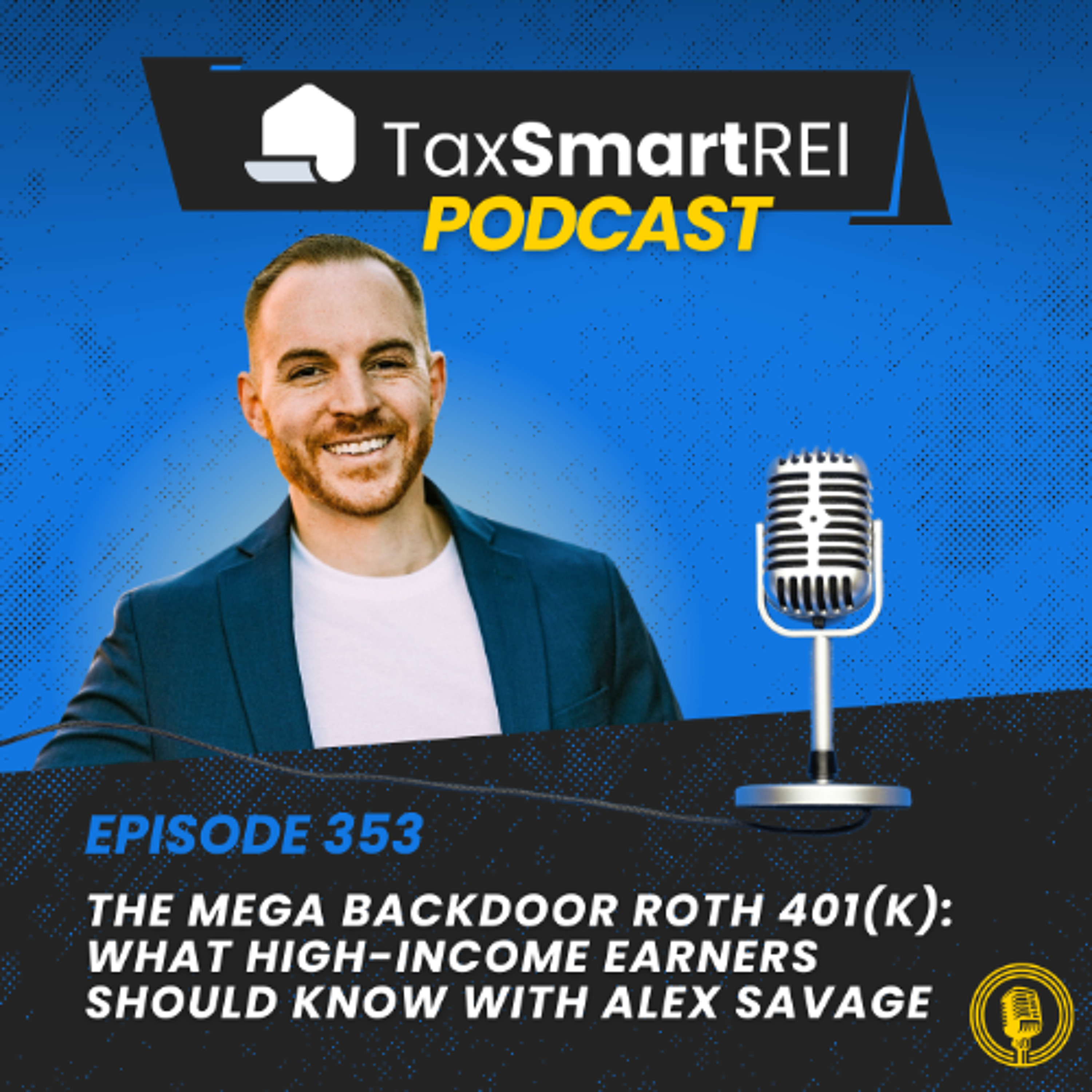
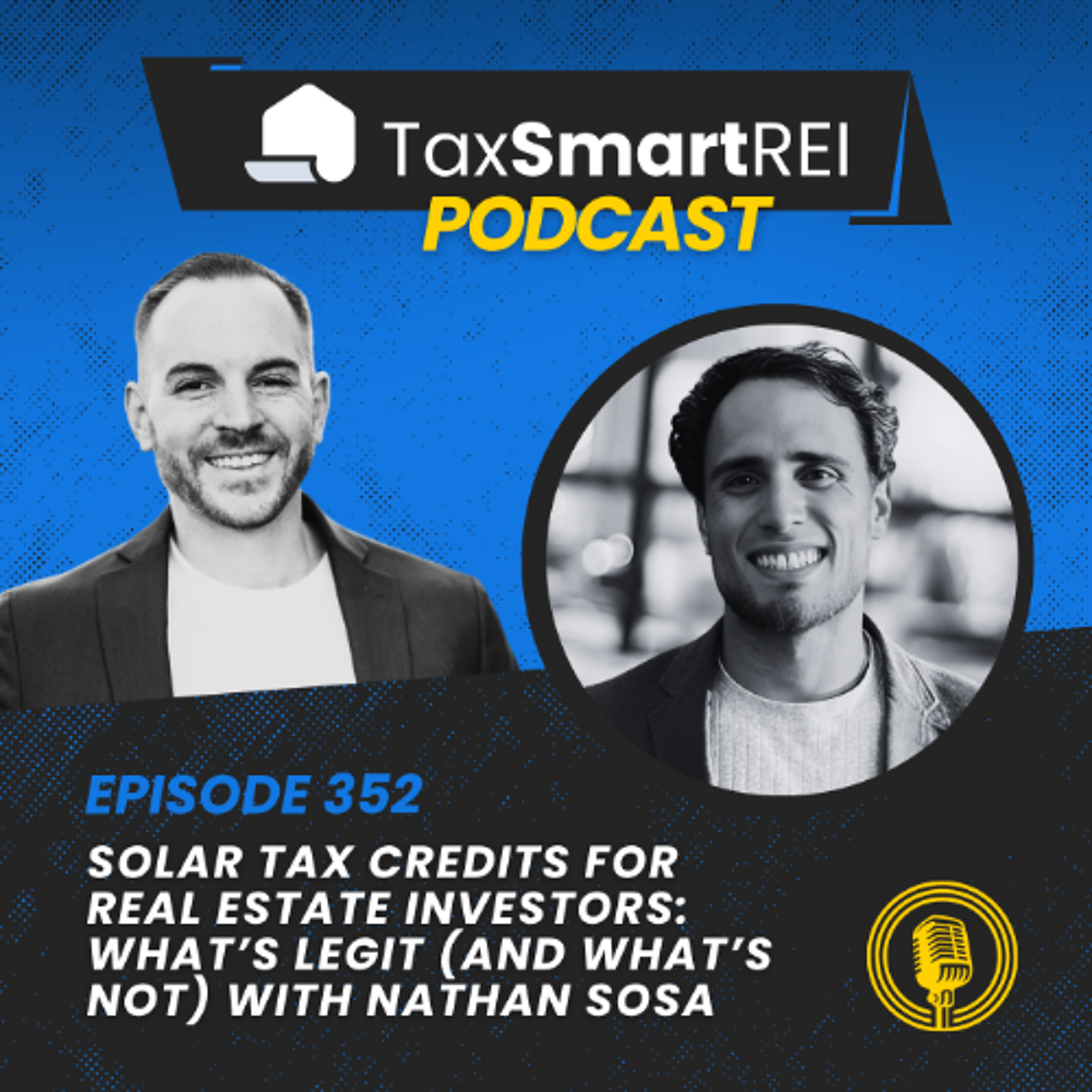
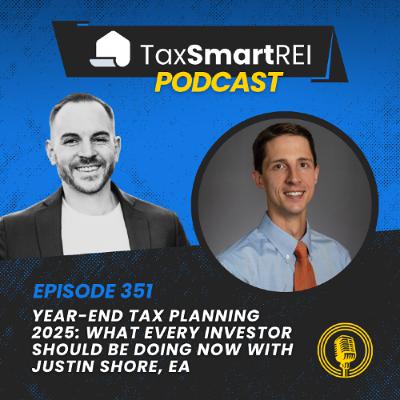
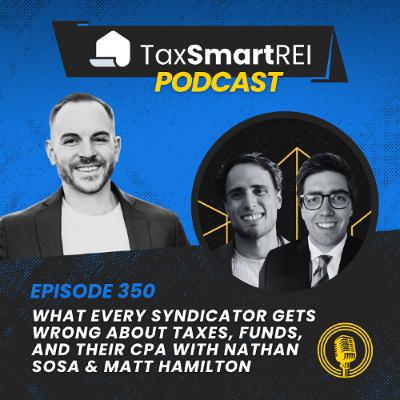
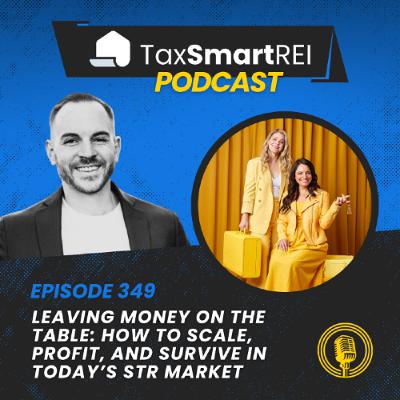
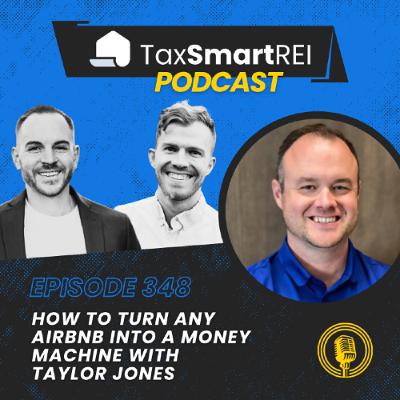
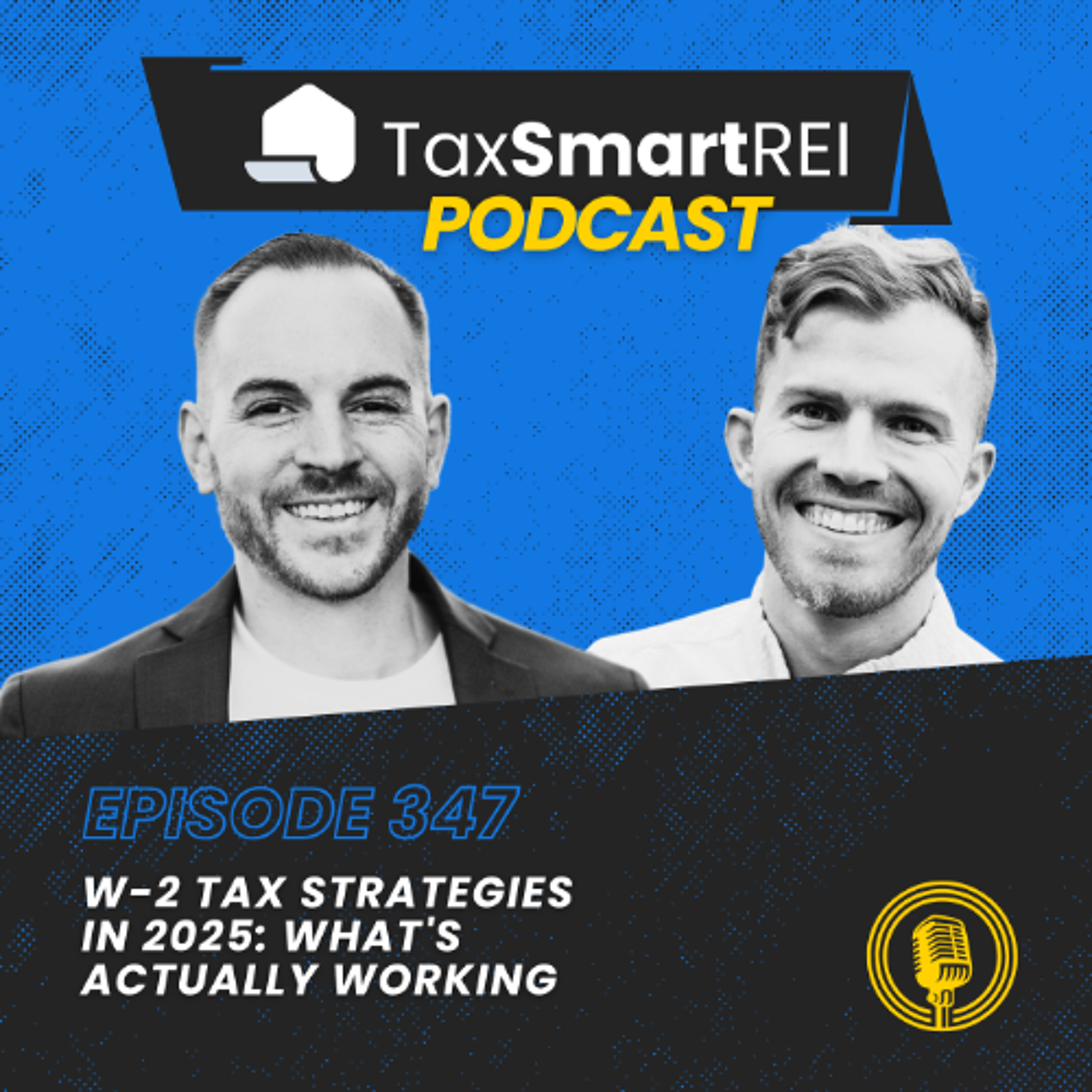
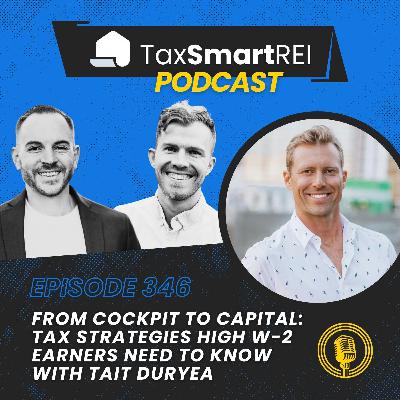

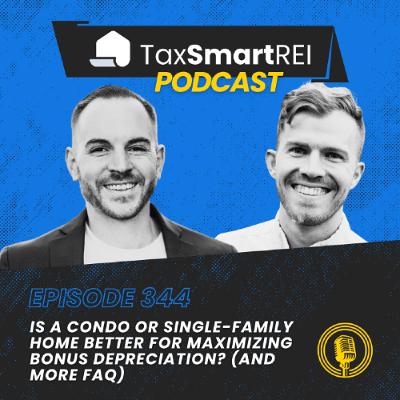
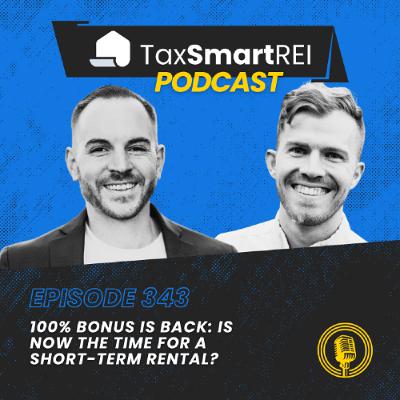
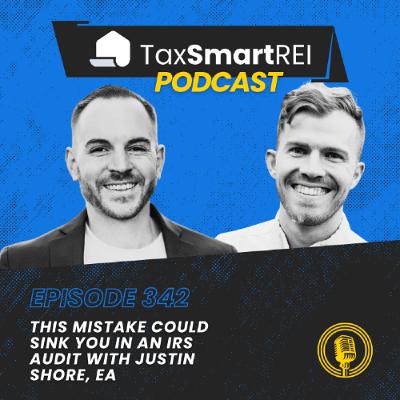
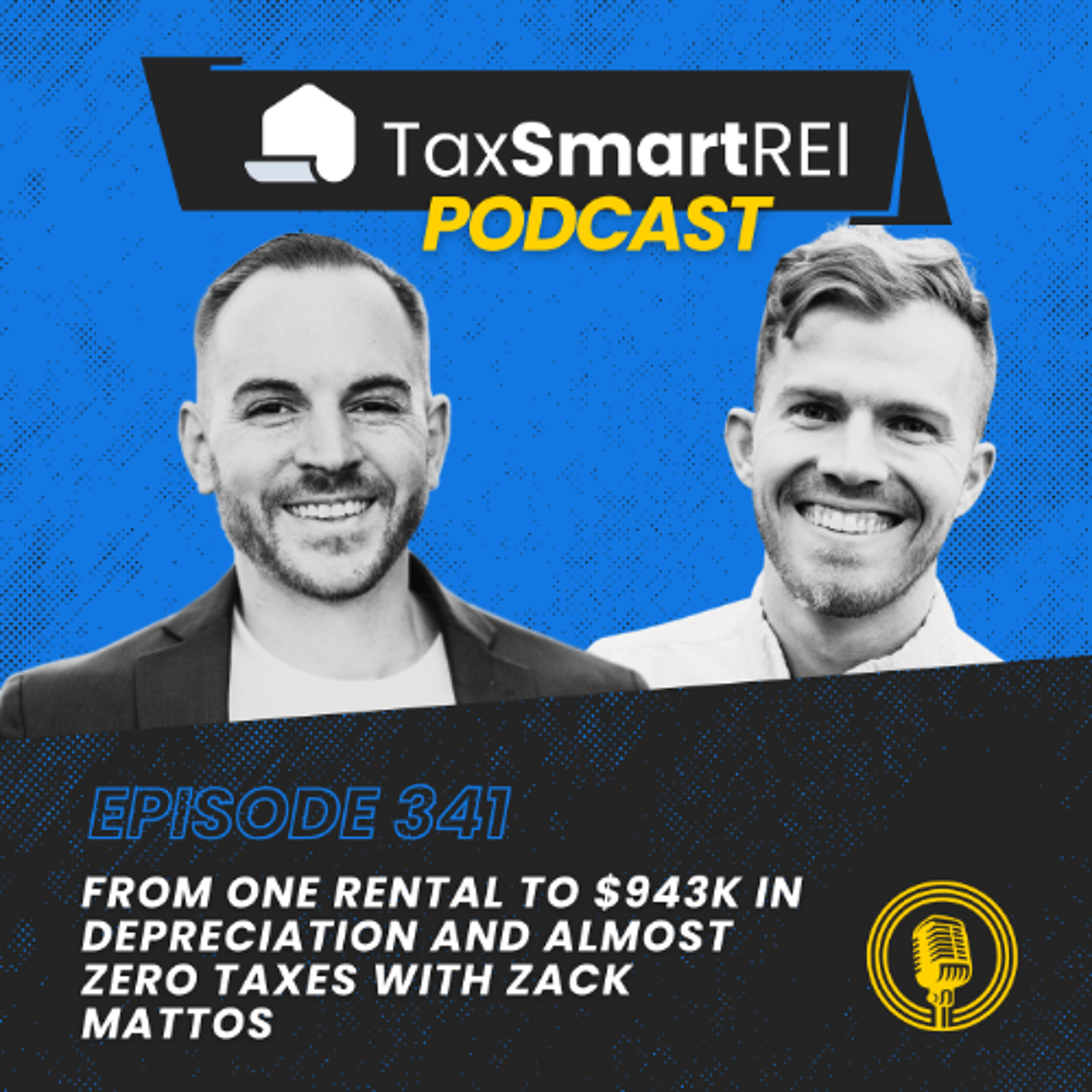
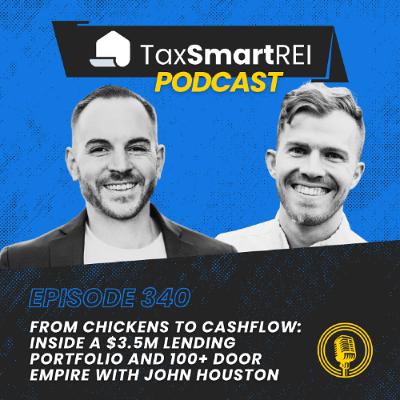
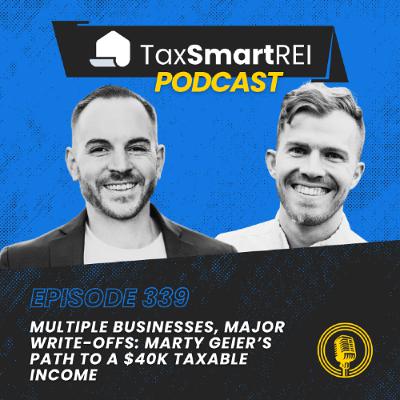
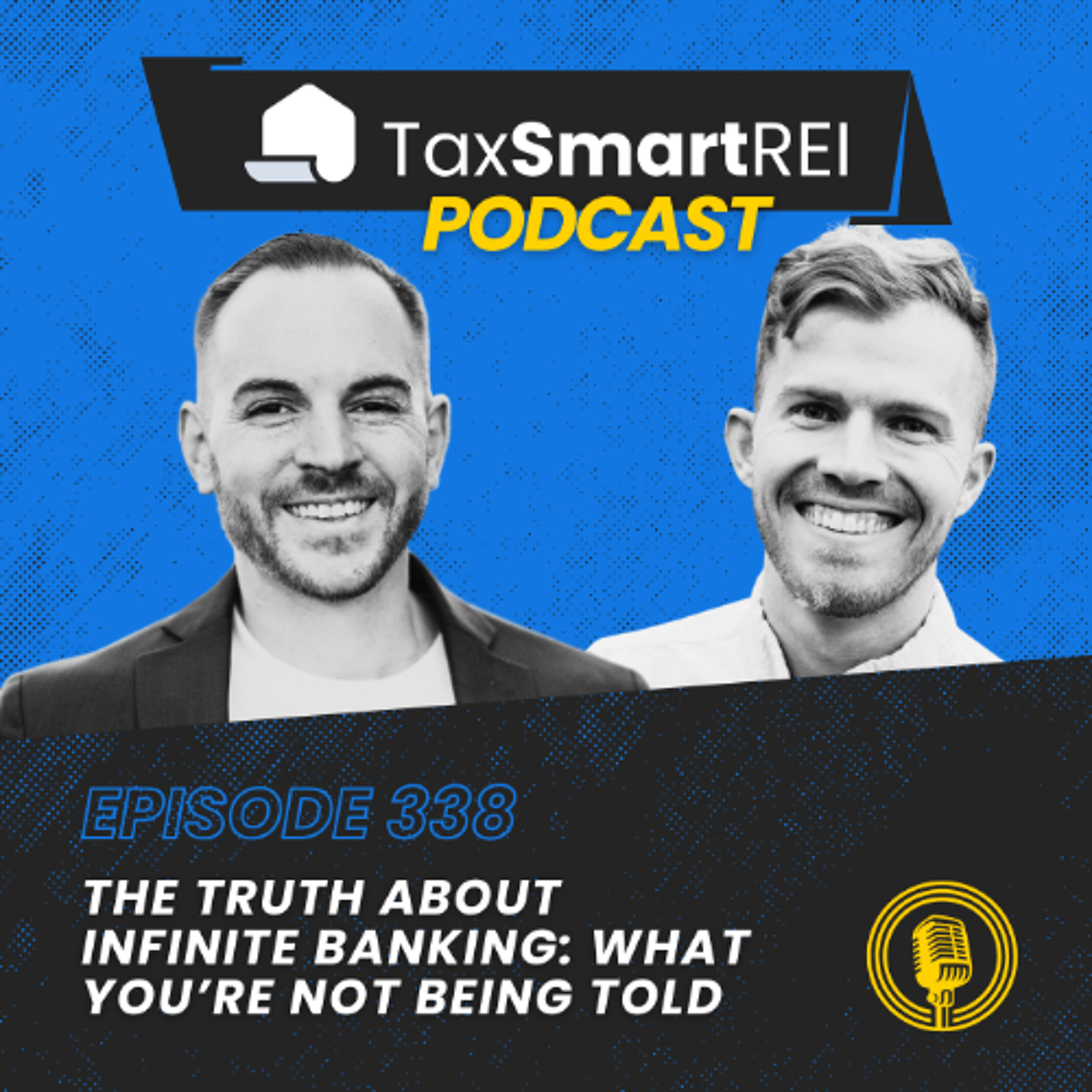
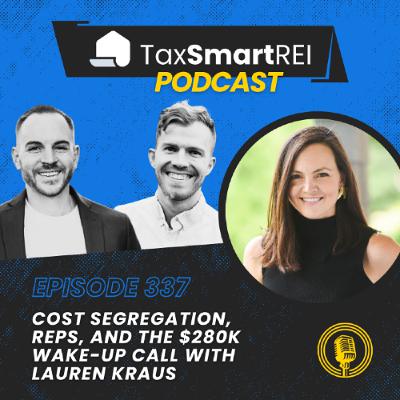
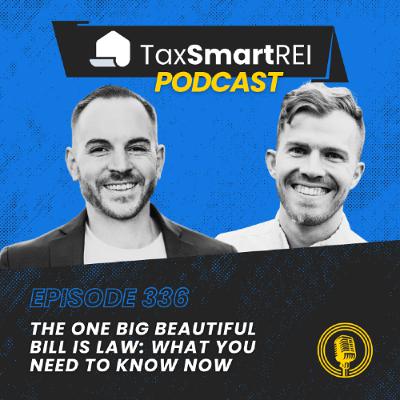
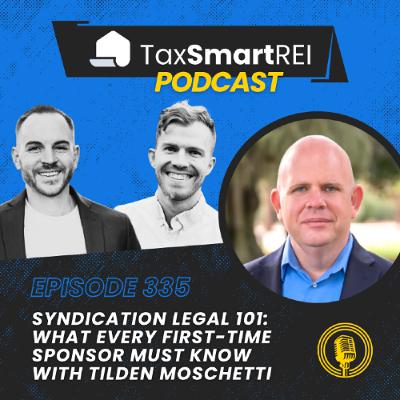
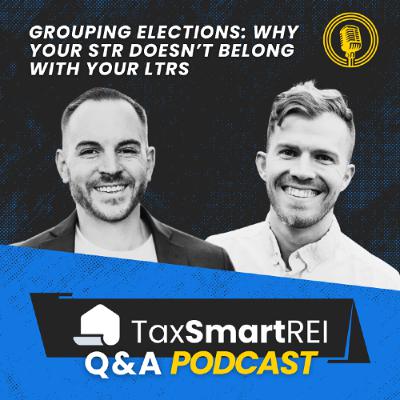



Public shaming? Wow. Great boss.
Nice,i liked